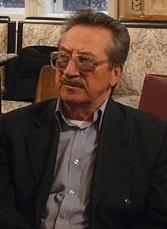
Esteemed Mr. Yevhen Zakharov!
Your letter has prompted me to reflect more deeply on my past and present. I haven’t engaged in this level of analysis since my time in the SHIZO (a punishment cell in a Soviet concentration camp for up to 15 days; as the zeks, or prisoners, used to say: punishment by hunger, cold, and sleeplessness), during those periods when reading was forbidden there.
I considered myself a dissident, but I believe dissidence is political honesty. Both it and honesty stand against a criminal world. I also want to share my view on this: a lone criminal, if he commits crimes by himself, has criminal capabilities to the first mathematical power. When criminals unite into a gang, their criminal capabilities grow squared. The Mafia is already a criminal, illegal statelet—crime cubed. A totalitarian state is crime to the fourth mathematical power; only other totalitarian states can surpass it in criminality.
The USSR collapsed primarily due to the default of 1984, when OPEC ended its embargo on oil sales to Western countries and world oil prices plummeted. The immense role of the Ukrainian dissident movement, and especially the Ukrainian Helsinki Group and their colleagues from other sub-Soviet republics, was in restraining the repressive threats of the Brezhnev regime. And during the collapse of the USSR, it was thanks to them that it did not happen as bloodily as it later did in Yugoslavia—the world was afraid of just such a collapse of the USSR with its incredible stockpiles of nuclear, missile, chemical, and bacteriological weapons.
It is also worth adding that Ukraine suffered multi-million losses of its best people in the USSR, and its cultural and historical values were destroyed; the Stalinist regime systematically settled Russians on the territories cleared of Ukrainians. In these conditions, Ukrainian dissidence promoted Ukrainian patriotism and nurtured the idea of its own independent state. And it was largely for this reason that the referendum of December 1, 1991, with over 90% in favor of Ukraine’s independence, was significant for the other republics (except for the Baltics, which gained freedom earlier).
Dissidence-as-honesty is also useful under the authoritarian regimes of Kuchma or Yanukovych. The Maidan was an explosion of mass honesty; the years-long “Kuchma, get out!” movements served as training for it, and it also needed the support of Petro Poroshenko’s Channel 5. Democracy and a free market economy are winning all over the world.
Vitaliy Shevchenko
P.S. In our time, Ukraine’s accession to the WTO, NATO, and the European Union are like stages in the civilizing of Ukraine. Each of these accessions is preceded by internal reforms that are beneficial for the majority of citizens and extremely undesirable for criminals. For example, Yanukovych did not refuse to join NATO—no one was inviting us there. Yanukovych refused the next preparatory stage, which involved reforms in five spheres of our state’s life, the first on the list being judicial reform. Apparently, that is what frightened our prime minister.